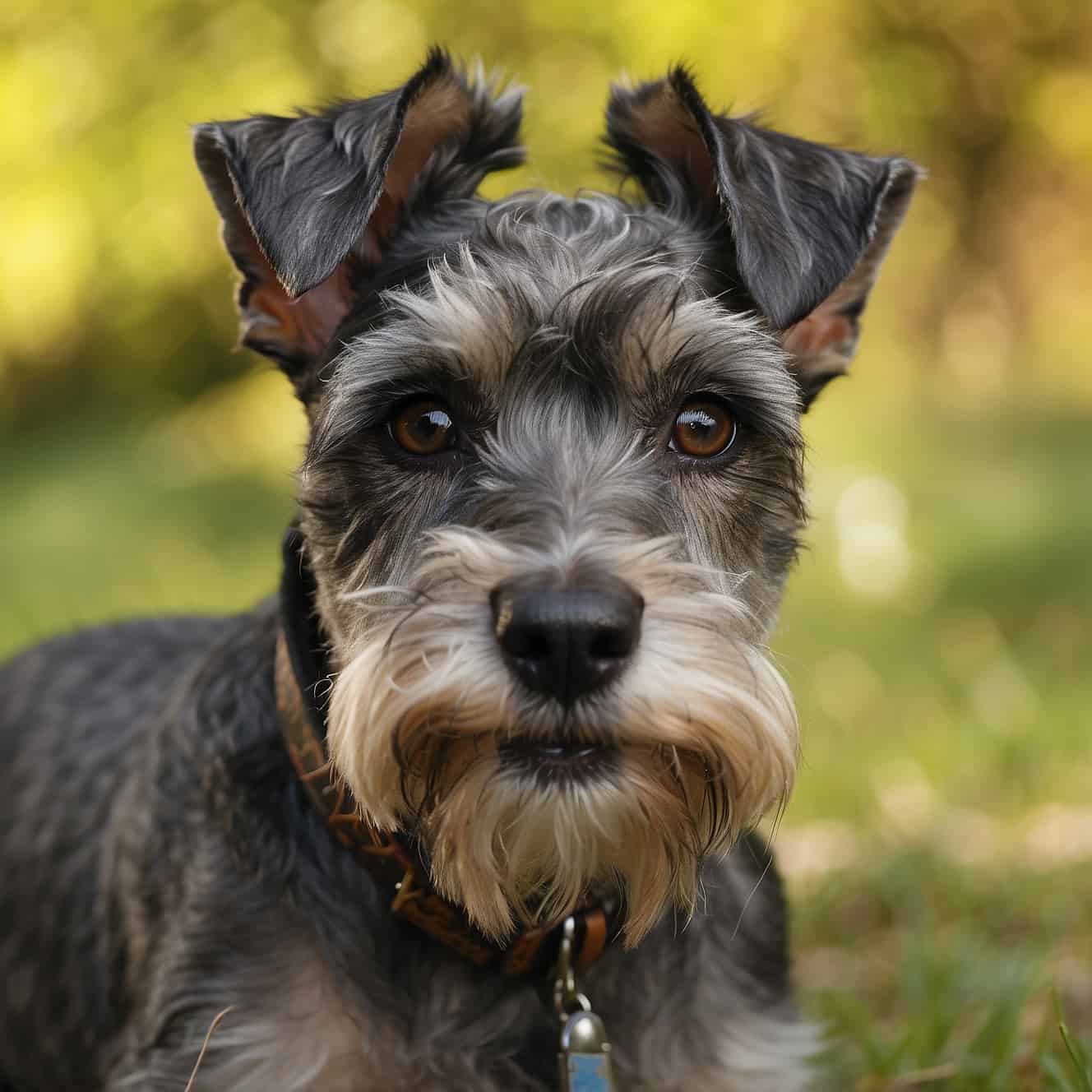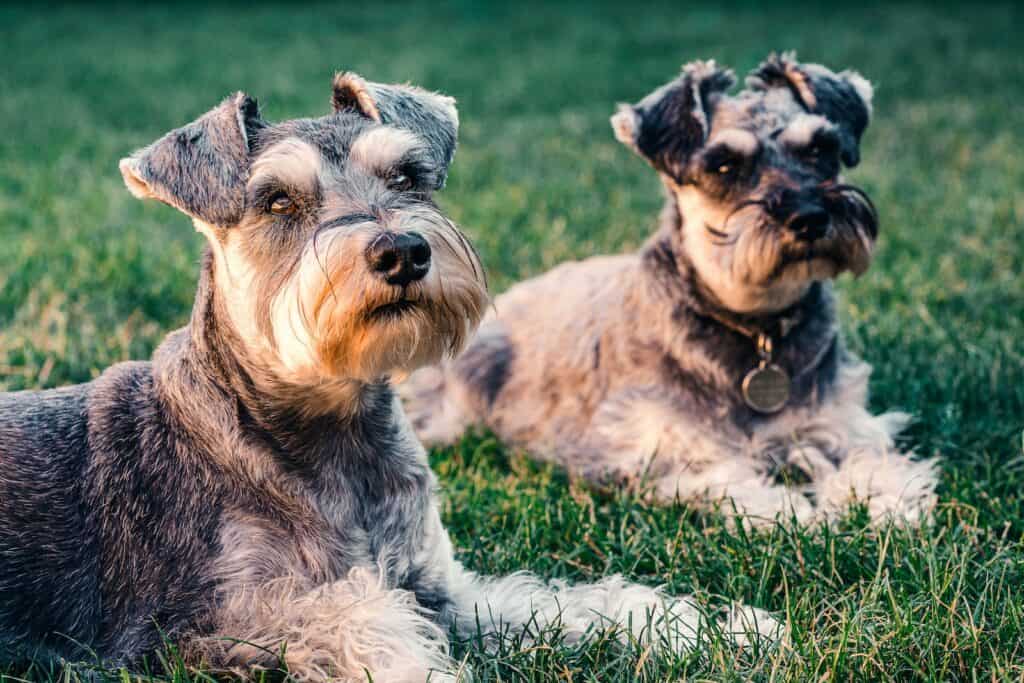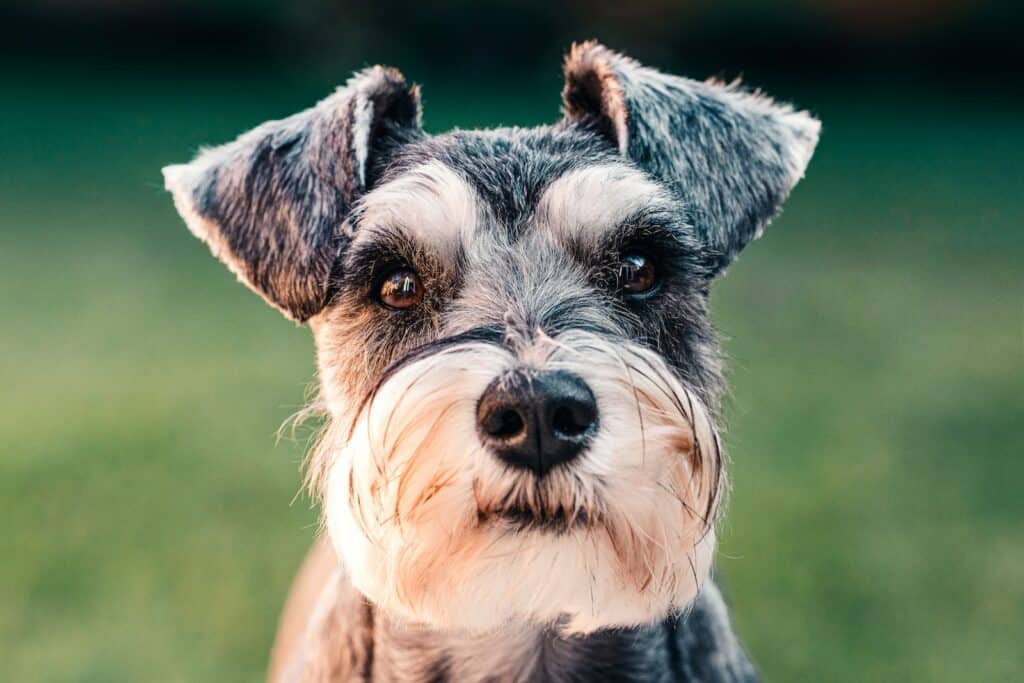The Miniature Schnauzer is a small breed with a big personality. Learn about their history, understand their care needs, and discover the intelligence and charm that have made Miniature Schnauzers beloved pets.

| Category (Explanation) | Breed Information |
|---|---|
| Year of Breed Conception | 19th century |
| Country of Origin | Germany |
| Weight (lbs & kg) (Male) | 11-18 lbs (5-8 kg) |
| Weight (lbs & kg) (Female) | 10-15 lbs (4.5-7 kg) |
| Coat Type | Double coat, wiry outer coat |
| Color Variations | Salt and pepper, black and silver, black |
| Shedding Level (Low, Moderate, High) | Low |
| Height (cm & in) | 12-14 inches (30-36 cm) |
| Breed Size | Small to Medium |
| Trainability (Low, Moderate, High) | High |
| Mental Needs (Low, Moderate, High) | Moderate |
| Intelligence Level (Low, Moderate, High) | High |
| Energy Level (Low, Moderate, High) | Moderate |
| Agility (Low, Moderate, High) | Moderate |
| Loyalty (Low, Moderate, High) | High |
| Playfulness (Low, Moderate, High) | High |
| Exercise Needs | Regular exercise and playtime |
| Guarding Proficiency (Low, Moderate, High) | Moderate |
| Sociability with Children (Low, Moderate, High) | High |
| Barking Level (Low, Moderate, High) | Moderate |
| Digging Tendency (Low, Moderate, High) | Low |
| Destructive Behavior (Low, Moderate, High) | Low |
| Drooling Level (Low, Moderate, High) | Low |
| Obedience Level (Low, Moderate, High) | High |
| Apartment Friendly (Yes/No) | Yes |
| Inherent Prey Drive | Moderate |
| Physical Risk to Others (Low, Moderate, High) | Low |
| Travel Fatality Risk (Low, Moderate, High) | Low |
| Allergen Potential | Low |
| Health Concerns (List of Common Health Concerns) | Diabetes, Pancreatitis, Bladder Stones |
| Average Life Expectancy (Life Expectancy in Years) | 12-15 years |
Woof Mastery is reader supported and our articles may contain affiliate links.
Instead of running third party ads that we have no control of we only use links from high-quality companies we are directly partnered with. Making use of these links come at no cost to you our reader, and in many cases have the extra benefit of discounted rates or sign up bonuses.
If you’re interested you can read more about our affiliate policy here.
We appreciate your support and always insure that the products and services we recommend are high-quality, helpful and relevant to the subject at hand!
The Miniature Schnauzer is a small breed with a big personality. Originating in Germany, they were bred as rat catchers and farm dogs. Their distinctive appearance, including a beard and bushy eyebrows, has been a hallmark feature for centuries. Miniature Schnauzers’ intelligence and charm have made them popular pets. Their role transitioned from working dogs to cherished family members. Today, Miniature Schnauzers continue to be known for their big personality in a small breed, capturing the hearts of those who appreciate their intelligence and spirited nature.

The Miniature Schnauzer is a small breed with a big personality. What makes them special is their big personality, intelligence, and charm. Learn about their history, understand their care needs, and discover what sets them apart. Miniature Schnauzers are special for their spirited disposition, making them beloved pets that bring joy and liveliness to their owners’ lives.
The Miniature Schnauzer is a small breed with a big personality. Originally from Germany, these dogs have a traditional role closely tied to their roots as farm and ratting dogs. They were tasked with hunting and eliminating rats and other vermin from farms and households. Their small size and alert disposition made them excellent at this job. Over time, they transitioned to being cherished family pets, but their historical role as diligent and alert working dogs remains a part of their character.
Miniature Schnauzers are known for their big personalities in a small breed. They are characterized by their intelligence and charm. These terriers can be loving and make great companions. They require training and socialization to bring out their best qualities as affectionate and intelligent family pets.
The Miniature Schnauzer is a small breed with a big personality. They are known for their affectionate and intelligent nature. While they can be loving companions, their independent spirit may require consistent training and socialization. Early exposure to different people and situations can help them develop into well-behaved pets. Their alertness and charm make them great watchdogs.
Miniature Schnauzers are small dogs with a distinctive appearance, including a dense, wiry coat that comes in salt and pepper or black and silver colors. They have a well-proportioned body with a square-shaped head, bushy eyebrows, and a distinctive beard. Miniature Schnauzers have dark, expressive eyes and small, V-shaped ears that stand erect. They have a straight tail and sturdy legs. They have a confident and intelligent gait, reflecting their big personalities in a small breed.
Miniature Schnauzers have a dense, wiry coat that can come in various colors. Common coat colors for Miniature Schnauzers include salt and pepper (a mix of black and white), black and silver, or solid black. These colors give them a distinguished and elegant appearance, and their bushy eyebrows and beard add to their charming look.
Miniature Schnauzers have a dense, wiry coat that typically comes in solid black or salt-and-pepper variations. Their bushy eyebrows and facial hair give them a dignified and expressive look.
Miniature Schnauzers have a low shedding level. They have a double coat with a soft undercoat and a wiry topcoat. Regular grooming, including brushing, helps manage shedding and maintains the coat’s texture. While they shed minimally, attention to their grooming needs and occasional grooming sessions contribute to reduced shedding. Overall, Miniature Schnauzers are considered to be a breed with low maintenance in terms of shedding.
Miniature Schnauzers have a distinctive double coat that requires regular grooming to maintain its appearance.
Brushing: Regular brushing, at least 2-3 times a week, is necessary to prevent matting and remove loose hair. Use a slicker brush or a comb suitable for their coat.
Stripping: Miniature Schnauzers may require hand-stripping or clipping to maintain the texture of their coat. This can be done by a professional groomer.
Bathing: Regular baths, about every 4-6 weeks, using a mild dog shampoo, help keep the coat clean. Thoroughly rinse and dry after the bath.
Ears: Regularly check and clean their ears to prevent wax buildup or infections. Use a damp cotton ball or a veterinarian-recommended ear cleaning solution.
Nails: Keep their nails trimmed to a comfortable length, as long nails can cause discomfort and affect their gait.
Teeth: Brush their teeth regularly to maintain good oral hygiene. Dental chews or toys can also be beneficial.
Eye Care: Monitor their eyes for signs of irritation or discharge. Clean the eye area with a damp cloth if necessary.
Miniature Schnauzers have a moderate activity level. While they are lively and enjoy playtime, they do not have extremely high exercise needs. Daily walks, interactive play, and engaging activities are usually sufficient to meet their energy requirements. Miniature Schnauzers may also enjoy activities such as fetch. Regular exercise contributes to their overall well-being and helps prevent boredom-related behaviors. Tailor their activities to their age and individual preferences, providing a balance between physical and mental stimulation for a happy Miniature Schnauzer.
Miniature Schnauzers are known for their intelligence, marked by problem-solving abilities, adaptability, and a desire to please their owners. They are generally trainable and responsive to positive reinforcement training methods. Miniature Schnauzers can learn various commands and tasks. Their adaptability allows them to thrive in different living environments. Historically, they were skilled in roles such as hunting and guarding, showcasing social intelligence by forming strong bonds with their families. While they may not top the charts in terms of obedience, their intelligence makes them excellent companions and working dogs. Training, socialization, and mental stimulation contribute to their well-rounded and obedient nature.
Miniature Schnauzers thrive on mental stimulation. Engage them in activities like puzzle toys, obedience training, or interactive games to keep their minds sharp and active.
Social Interaction: They are social dogs and benefit from regular interaction with their family members. Loneliness can lead to anxiety, so provide companionship and attention.
Exercise: Regular physical activity is essential for both their physical and mental well-being. Exercise helps reduce stress and boredom.
Enter The Woof Mastery

Before welcoming a Miniature Schnauzer into your home, it’s important to recognize their energetic nature. Regular exercise and mental stimulation are essential to keep them happy. Their distinctive coat requires grooming, including regular trimming. Miniature Schnauzers thrive on companionship, so be prepared to spend quality time with them. Training and socialization contribute to well-rounded behavior. Prospective owners should be aware of potential health concerns and seek regular veterinary care to ensure their Miniature Schnauzer’s well-being.
Miniature Schnauzers, known for their intelligence and friendly nature, generally pose a low risk to others. Proper socialization and training contribute to positive interactions. Responsible ownership, understanding individual temperament, and adherence to local regulations play crucial roles in ensuring a well-behaved Miniature Schnauzer.
Miniature Schnauzers are known for being good with children. They are often affectionate and enjoy playtime. Supervision is important during play, and early socialization contributes to positive interactions. Positive reinforcement training and teaching children how to approach and handle the dog are important aspects.
Miniature Schnauzers are generally good swimmers. Their adaptable and friendly nature may make them enjoy water activities. Introduce them to water gradually and observe their comfort level. Always prioritize safety and use a canine life vest if needed, especially in situations where they may be at risk of fatigue.
Remember that Miniature Schnauzer puppies, like all puppies, are eager to please and learn. Positive and consistent training practices will help them become well-behaved, obedient, and happy adult dogs. Building a strong and trusting bond with your puppy through training is a rewarding experience for both you and your canine companion.
Miniature Schnauzers are known for being alert and may bark to alert their owners or express themselves. While they can be vocal, excessive barking is not a common trait. Proper training and socialization contribute to a well-behaved and appropriately vocal Miniature Schnauzer.
Miniature Schnauzers are adaptable and can live in various environments. They do well in homes with yards for play, but they can also adapt to apartment living with sufficient exercise. Regular walks and mental stimulation contribute to their well-being. Miniature Schnauzers enjoy being part of the family and thrive on companionship. Early training and socialization help in preventing behavioral issues.
Miniature Schnauzers are generally adaptable to travel conditions. Secure them in the vehicle using a crate or a suitable seatbelt harness. Monitor for signs of stress or discomfort and provide breaks for exercise. Familiar items and positive reinforcement can contribute to a positive travel experience for Miniature Schnauzers. Plan for regular breaks during long journeys to ensure their well-being.
Miniature Schnauzers may be prone to specific health concerns, and while not all individuals will experience these issues, it’s important for owners to be aware of potential risks. Common health concerns in Miniature Schnauzers include:
Regular veterinary check-ups, a balanced diet, proper exercise, and responsible breeding practices can contribute to the well-being of Miniature Schnauzers. Owners should be attentive to any signs of health issues and seek veterinary care as needed.
Proper nutrition is crucial for the health and well-being of Miniature Schnauzers. Here are some nutritional habits and best practices to consider for this breed:
Breed-Specific Laws (BSL): Miniature Schnauzers may be subject to breed-specific laws (BSL) in certain areas. These laws are often enacted at the local or municipal level and can vary widely from one jurisdiction to another.
Types of Restrictions: The specific restrictions imposed on Miniature Schnauzers under BSL can include mandatory spaying/neutering, special licensing, liability insurance requirements, muzzling in public, and, in some cases, bans on ownership. The severity of these restrictions depends on local regulations.
Rationale for BSL: BSL is typically implemented based on concerns about public safety and perceived risks associated with specific breeds, often due to incidents involving dog attacks. While Miniature Schnauzers are not inherently aggressive, they can be affected by BSL due to their physical resemblance to breeds that are sometimes included in these laws.
Controversy: It’s important to note that BSL is a controversial topic. Critics argue that it unfairly targets breeds rather than addressing individual dog behavior and that responsible ownership and training should be emphasized instead of breed-specific restrictions.
Local Regulations: To determine if there are breed-specific laws or restrictions regarding Miniature Schnauzers in your area, you should check with your local animal control or government authorities. Be aware of and comply with any local regulations to ensure that you are in compliance with the law while owning a Miniature Schnauzer.
Woof Mastery is reader supported and our articles may contain affiliate links.
Instead of running third party ads that we have no control of we only use links from high-quality companies we are directly partnered with. Making use of these links come at no cost to you our reader, and in many cases have the extra benefit of discounted rates or sign up bonuses.
If you’re interested you can read more about our affiliate policy here.
We appreciate your support and always insure that the products and services we recommend are high-quality, helpful and relevant to the subject at hand!
Myth 1: Miniature Schnauzers are High-Maintenance Grooming Dogs
Myth 2: They are Yappy and Noisy
Myth 3: Miniature Schnauzers are Not Good with Children
Myth 4: They are Only Suitable for Apartment Living
Myth 5: Miniature Schnauzers Don’t Get Along with Other Pets
These myths underscore the importance of understanding the individual characteristics and needs of Miniature Schnauzers. With proper care, training, and socialization, they can make wonderful and adaptable companions.
George W. Bush: The 43rd President of the United States, George W. Bush, had a Miniature Schnauzer named Miss Beazley. Miss Beazley was known for her presence in the White House and as a companion to the Bush family.
The Miniature Schnauzer holds cultural significance in various aspects:
The Miniature Schnauzer, known for its distinctive beard and eyebrows, gained popularity in the late 19th century. While there may not be a single most famous historical owner, Miniature Schnauzers became cherished companions known for their intelligence and friendly demeanor.
Miniature Schnauzers, being a popular and well-loved breed, have faced specific challenges:
The Miniature Schnauzer, known for its distinctive beard and eyebrows, is believed to have been developed through a combination of terrier and schnauzer breeds. The contributing breeds include:
Miniature Schnauzers, with their distinctive appearance and friendly demeanor, make beloved family companions. Known for their loyalty and adaptability, they seamlessly integrate into various living conditions. Their moderate grooming needs and manageable size make them suitable for families. Miniature Schnauzers excel in activities and training, showcasing their agility and enthusiasm. Their affectionate nature and compatibility with children make them valued additions to households seeking a playful and devoted companion.